| | ||||||||||
| ||||||||||
| ||||||||||
| ||||||||||
The 1951 New Zealand Labour Party leadership election was held on 17 January to choose the fifth leader of the New Zealand Labour Party. The election was won by Hutt MP and incumbent deputy-leader Walter Nash.
| | ||||||||||
| ||||||||||
| ||||||||||
| ||||||||||
The 1951 New Zealand Labour Party leadership election was held on 17 January to choose the fifth leader of the New Zealand Labour Party. The election was won by Hutt MP and incumbent deputy-leader Walter Nash.
Labour leader Peter Fraser had led the party since 1940. He led New Zealand through the majority of World War II and retained power in the 1943 and 1946 elections. An ailing Fraser was unable to win the 1949 election and Labour lost power after 14 years in office. Just one year later he died, leading to the position of party leader to become vacant. [1] Deputy Leader of the Opposition Walter Nash had been acting leader since Fraser was taken ill the year earlier and was viewed as an obvious successor.
As the election of Nash to replace Fraser was viewed as an inevitability, most speculation at the time was concentrated on the deputy leadership and the imminent by-election for Fraser's seat of Brooklyn. Both of these questions revolved around former cabinet minister Arnold Nordmeyer (seen as a viable contender for both positions) but had lost his seat in the 1949 election. [2] As acting leader, Nash brought the election of leader to before the by-election meaning Nordmeyer was unable to contest either position as only elected members of the caucus were eligible to stand. There was also suggestions that the deputy leadership should be left vacant until after the by-election. [3]
Nash had served as a Member of Parliament since 1929. Most saw Nash, Fraser's deputy, as the most logical, or even inevitable, successor as leader. [4] [2]
Jerry Skinner was seen by many as Labour's rising star. [5] However, despite speculation that he may seek leadership, but was dismissed as mere media gossip. Skinner ruled himself out in favour of Nash, which was then seconded by Angus McLagan. [4]
Arnold Nordmeyer was also seen as a contender for future leadership, but lost his seat in Parliament in 1949. [6] When Fraser died in December 1950 Nordmeyer was selected to stand for Labour in the by-election for Fraser's seat. The date set by caucus for the leadership election was scheduled before Nordmeyer could re-enter Parliament. The haste taken was an indication that Nordmeyer was considered a threat to Nash and his supporters. [6] According to Warren Freer Nash as acting leader brought the selection forward to 17 January, causing quite an argument in caucus, although caucus eventually voted by a majority of two to proceed with the early vote. [7]

As Nash was the only officially nominated candidate, he was elected unopposed as leader. [4] Jerry Skinner was then elected as Nash's Deputy-leader. The vote for the deputy position was Skinner twenty-two, Terry McCombs seven and Fred Hackett two. [5] [7] Both Angus McLagan and Mick Moohan were likewise nominated to stand for the deputy leadership, but both declined to do so. [8]
| Candidate | Votes | % | |
|---|---|---|---|
| Jerry Skinner | 22 | 70.96 | |
| Terry McCombs | 7 | 22.58 | |
| Fred Hackett | 2 | 6.45 | |
| Majority | 15 | 48.38 | |
| Turnout | 31 | — | |
Nash would remain the Labour Party's leader until his retirement in early 1963. [9] He led them to successive election losses in 1951 and 1954, though led them successfully in 1957. Upon Nash's election acting-Prime Minister Keith Holyoake congratulated him on winning the leadership. Nash's first act as leader was to attend a morning tea function honouring Sir John Anderson, the chairman of the Port of London Authority, who also congratulated Nash. [10]

Sir Walter Nash was a New Zealand politician who served as the 27th prime minister of New Zealand in the Second Labour Government from 1957 to 1960. He is noted for his long period of political service, having been associated with the New Zealand Labour Party since its creation.

Sir Arnold Henry Nordmeyer was a New Zealand politician and Presbyterian minister. As a member of Parliament (MP) he played a crucial role in the Labour Party, serving from 1935 to 1969. He served as minister of finance (1957–1960) and later as leader of the Labour Party and leader of the Opposition (1963–1965). Although he was a prominent statesman, Nordmeyer never ascended to the role of prime minister.

Sir Wallace Edward Rowling, commonly known as Bill Rowling, was a New Zealand politician who was the 30th prime minister of New Zealand from 1974 to 1975. He held office as the leader of the Labour Party.

In New Zealand, the term Black Budget refers to the government budget of 26 June 1958, in which Minister of Finance Arnold Nordmeyer increased taxes on beer, tobacco, cars and petrol.
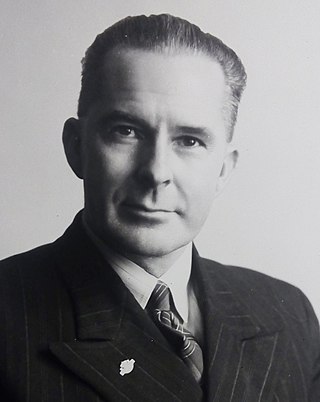
Clarence Farrington Skinner, commonly known as Jerry or Gerry Skinner, was a Labour politician from New Zealand, the third deputy prime minister of New Zealand between 1957 and 1960, and a minister from 1943 to 1949 and 1957 to 1960 in the First and Second Labour governments.

Frederick Hackett was a New Zealand politician of the Labour Party. He was a minister in both the First and Second Labour Governments of New Zealand and later the deputy leader of the opposition.

Michael Moohan was a New Zealand politician of the Labour Party. Seldom known to anyone by anything other than "Mick", he was a major organisational figure in the Labour Party's early history and went on to become a significant politician in his own right as an MP and cabinet minister.
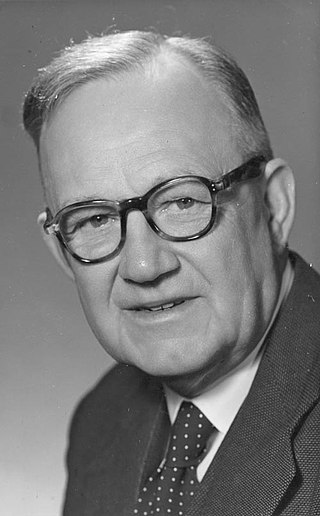
William Theophilus Anderton was a New Zealand politician of the Labour Party. He served as Minister of Internal Affairs in the second Labour Government, from 1957 to 1960.

Allan "Martyn" Finlay was a New Zealand lawyer and politician of the Labour Party. He was an MP in two separate spells and a member of two different governments, including being a minister in the latter where he reformed the country's justice system.
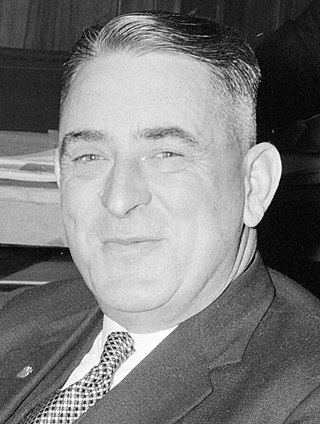
Philip George Connolly was a New Zealand politician of the Labour Party.
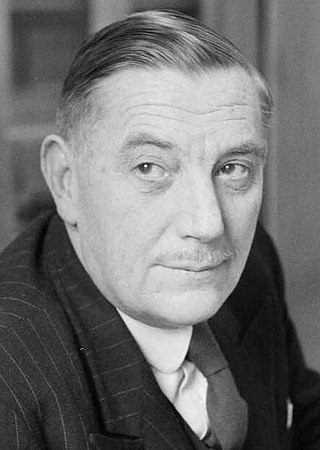
Raymond Boord was a New Zealand politician of the Labour Party.
James Gladstone Edwards was a member of parliament for Napier, in the North Island of New Zealand.

Angus McLagan was a New Zealand politician of the Labour Party. He was a member of the Legislative Council and later Member of Parliament for Riccarton. He was a cabinet minister from 1942 to 1949 in the First Labour Government.
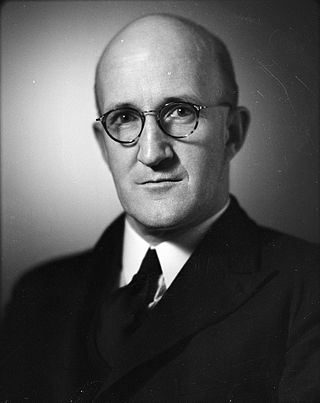
The Brooklyn by-election 1951 was a by-election held in the Brooklyn electorate in Wellington during the 29th New Zealand Parliament, on 17 February 1951.

The New Zealand Labour Party leadership election, 1940 was held on 4 April 1940 to choose the fourth leader of the New Zealand Labour Party. The election was won by Wellington Central MP Peter Fraser.
The 1965 New Zealand Labour Party leadership election was held on 9 December 1965 to determine the future leadership of the New Zealand Labour Party. The election was won by Lyttelton MP Norman Kirk.

The 1974 New Zealand Labour Party leadership election was held on 6 September 1974 to determine the eighth leader of the New Zealand Labour Party. The election was won by Tasman MP Bill Rowling.

The 1954 New Zealand Labour Party leadership election was held on 23 June 1954 to determine the future leadership of the New Zealand Labour Party. The election was won by Hutt MP Walter Nash, the incumbent leader.

The 1963 New Zealand Labour Party leadership election was held on 26 February to choose the sixth leader of the New Zealand Labour Party. The election was won by Island Bay MP Arnold Nordmeyer.
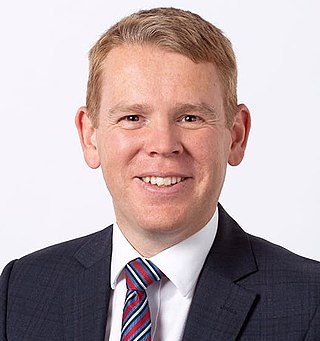
The leader of the Labour Party is the highest-ranked political position within the New Zealand Labour Party, who serves as the parliamentary leader and leading spokesperson of the party. The current leader is Chris Hipkins, after Jacinda Ardern resigned.